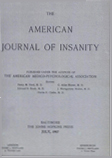CHRONIC RHEUMATIC BRAIN DISEASE AS A POSSIBLE FACTOR IN THE CAUSATION OF SOME CASES OF DEMENTIA PRÆCOX
Abstract
Nine per cent of dementia præcox patients who were examined at autopsy showed signs of a chronic rheumatic infection, involving the brain as well as the heart valves. The rheumatic alterations in the brain consisted of a recurrent vascular process of an obliterating endarteritic type, affecting in the dementia præcox group mainly the meningeal and cortical vessels with subsequent degeneration in the cortex. The process as a whole has been termed chronic rheumatic brain disease. It evolution occurs in terms of years and decades and not of weeks or months as in the acute period of infection. When lesions develop they are, with rare exceptions, no longer acute and actively inflammatory, but are slowly proliferative. After years of symptomatic quiescence, progression of the disease from the latent stage to subacute activity may take place.
Access content
To read the fulltext, please use one of the options below to sign in or purchase access.- Personal login
- Institutional Login
- Sign in via OpenAthens
- Register for access
-
Please login/register if you wish to pair your device and check access availability.
Not a subscriber?
PsychiatryOnline subscription options offer access to the DSM-5 library, books, journals, CME, and patient resources. This all-in-one virtual library provides psychiatrists and mental health professionals with key resources for diagnosis, treatment, research, and professional development.
Need more help? PsychiatryOnline Customer Service may be reached by emailing [email protected] or by calling 800-368-5777 (in the U.S.) or 703-907-7322 (outside the U.S.).



